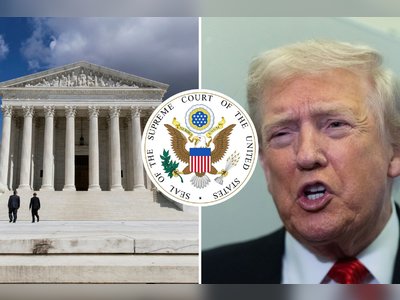
Are the UK's anti-money laundering rules for the art market being adhered to?
It may come as a surprise to learn that more than 18 months have now passed since the UK’s new anti-money laundering (AML) rules came into force.
Time flies when you’re having fun, or so they say. It may come as a surprise to learn that more than 18 months have now passed since the UK’s new anti-money laundering (AML) rules came into force. The regulations imposed significant new AML-related obligations on art-market participants (a term which includes those who trade in, or act as an intermediary in, the sale and purchase of works of art with a value of 10,000 euros or more). At the time the new laws came into force, there was some uncertainty over how exactly these obligations should be met, and the true extent of the money laundering risks presented by the UK art market. A year and a half on, have these questions been cleared up – and how are art businesses faring?
In June 2021 the government published a new AML risk assessment specifically for art-market participants to assist them in identifying the key risk indicators in their businesses. This guidance provides some helpful clarity in terms of how some of the new AML laws should be applied and how the government currently assesses the risks of money laundering in the UK art market. Art-market participants would be wise to read the short document in full. (Interior designers may be surprised to read that they too may be regulated for AML.)
This guidance follows on from the UK National Risk Assessment of Money Laundering and Terrorist Financing of December 2020 in which the risk posed by art-market participants was assessed for the first time and was found to be ‘high’. The same conclusion was also reached in the latest guidance, which claims that it is ‘too early’ for the government to fully assess the impact of the implementation of the new AML laws for the art market. Indeed, the guidance states that ‘the use of illicit funds to buy, then sell high value goods is one of the oldest, and most common elements in money laundering and terrorist financing methodologies’.
As dealers will no doubt know by now, broadly speaking the new AML laws oblige art-market participants to conduct what is referred to as ‘customer due diligence’, put in place related systems and controls (including a business risk assessment and AML policy), and to train their staff to comply with their AML legal and regulatory responsibilities. By properly carrying out these obligations dealers can both reduce the risk of their business inadvertently becoming involved with money laundering (with the consequent legal and reputational risks) and reduce the risk of becoming liable for the criminal offence of ‘failing to disclose’ money laundering.
In the recent guidance, the government highlights another potential reality for anyone inadvertently getting involved with money laundering. The guidance states: ‘It is vital that [art-market participants] understand and meet their obligations […] to protect themselves, their families and their communities from the dangers of infiltration by criminals. Any weakness in the controls the business uses may be exploited by criminals who will seek to use, coerce or control the [art-market participant] to move more of their illicit money.’ In other words, if you are unfortunate enough to inadvertently be involved in a money laundering transaction you could find yourself pressurised into an ongoing relationship with criminals from which it is difficult and dangerous to extract yourself.
Art dealers implementing AML controls for the first time might understandably attempt to reduce the complexity of the legislation into a box-ticking exercise. However, a more holistic approach to AML controls is required for proper implementation. As a lawyer, I encourage my clients to try to understand (conceptually) what money laundering is, to learn to recognise the red flags and to think about the potential risks their business may be subject to. Only then can they properly determine how to perform appropriate customer due diligence in each circumstance. In my view, understanding how to conduct a risk assessment is the key, not only to implementing the law properly, but also to making the process more user-friendly.
Many dealers have invested in subscriptions to databases which, to a greater or lesser degree, can assist with customer due diligence procedures in terms of verification and checks. Some, such as Arcarta, operate an online platform which collects buyers’ documentation as part of the payment process. Others, such as World-Check, Experian and Acuris, conduct broad searches of databases. It is important to remember that, irrespective of such outsourcing, the responsibilities for conducting appropriate checks remain with the art-market participants. They must collect the necessary information and verification documentation and keep it in their own records for the requisite period (typically five years). They also need to understand each transaction and identify each client in order to conduct risk assessments and to potentially perform ongoing customer due diligence, and to spot linked transactions. Therefore, complete delegation is not an option.
Art dealers should be clear at the outset of any agreement with an outsourced provider as to the scope of the checks they will undertake. For example, are they checking for politically exposed persons and sanctioned individuals? If so, against which lists, and how often will those lists be updated? It would also be wise to ensure that all necessary data protection considerations have been addressed when subscribing to an outsourced provider of customer due diligence services.
In June 2021 the government published a new AML risk assessment specifically for art-market participants to assist them in identifying the key risk indicators in their businesses. This guidance provides some helpful clarity in terms of how some of the new AML laws should be applied and how the government currently assesses the risks of money laundering in the UK art market. Art-market participants would be wise to read the short document in full. (Interior designers may be surprised to read that they too may be regulated for AML.)
This guidance follows on from the UK National Risk Assessment of Money Laundering and Terrorist Financing of December 2020 in which the risk posed by art-market participants was assessed for the first time and was found to be ‘high’. The same conclusion was also reached in the latest guidance, which claims that it is ‘too early’ for the government to fully assess the impact of the implementation of the new AML laws for the art market. Indeed, the guidance states that ‘the use of illicit funds to buy, then sell high value goods is one of the oldest, and most common elements in money laundering and terrorist financing methodologies’.
As dealers will no doubt know by now, broadly speaking the new AML laws oblige art-market participants to conduct what is referred to as ‘customer due diligence’, put in place related systems and controls (including a business risk assessment and AML policy), and to train their staff to comply with their AML legal and regulatory responsibilities. By properly carrying out these obligations dealers can both reduce the risk of their business inadvertently becoming involved with money laundering (with the consequent legal and reputational risks) and reduce the risk of becoming liable for the criminal offence of ‘failing to disclose’ money laundering.
In the recent guidance, the government highlights another potential reality for anyone inadvertently getting involved with money laundering. The guidance states: ‘It is vital that [art-market participants] understand and meet their obligations […] to protect themselves, their families and their communities from the dangers of infiltration by criminals. Any weakness in the controls the business uses may be exploited by criminals who will seek to use, coerce or control the [art-market participant] to move more of their illicit money.’ In other words, if you are unfortunate enough to inadvertently be involved in a money laundering transaction you could find yourself pressurised into an ongoing relationship with criminals from which it is difficult and dangerous to extract yourself.
Art dealers implementing AML controls for the first time might understandably attempt to reduce the complexity of the legislation into a box-ticking exercise. However, a more holistic approach to AML controls is required for proper implementation. As a lawyer, I encourage my clients to try to understand (conceptually) what money laundering is, to learn to recognise the red flags and to think about the potential risks their business may be subject to. Only then can they properly determine how to perform appropriate customer due diligence in each circumstance. In my view, understanding how to conduct a risk assessment is the key, not only to implementing the law properly, but also to making the process more user-friendly.
Many dealers have invested in subscriptions to databases which, to a greater or lesser degree, can assist with customer due diligence procedures in terms of verification and checks. Some, such as Arcarta, operate an online platform which collects buyers’ documentation as part of the payment process. Others, such as World-Check, Experian and Acuris, conduct broad searches of databases. It is important to remember that, irrespective of such outsourcing, the responsibilities for conducting appropriate checks remain with the art-market participants. They must collect the necessary information and verification documentation and keep it in their own records for the requisite period (typically five years). They also need to understand each transaction and identify each client in order to conduct risk assessments and to potentially perform ongoing customer due diligence, and to spot linked transactions. Therefore, complete delegation is not an option.
Art dealers should be clear at the outset of any agreement with an outsourced provider as to the scope of the checks they will undertake. For example, are they checking for politically exposed persons and sanctioned individuals? If so, against which lists, and how often will those lists be updated? It would also be wise to ensure that all necessary data protection considerations have been addressed when subscribing to an outsourced provider of customer due diligence services.








